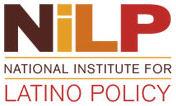
Race and Hispanic Questions
Research for the 2020 Census
Understanding Results from the 2010 Census Alternative Questionnaire Experiment Research on Race and Hispanic Origin and Current Research on Race and Ethnicity
The NiLP Network on Latino Issues (March 16, 2014)
 Based on presentations made by Census staff, this is an overview on the Census Bureau's 2010 Census Alternative Questionnaire Experiment (AQE) research on race and Hispanic origin. As a reference, all of the detailed information on the 2010 AQE is available online at the Census Bureau website (click here).
Based on presentations made by Census staff, this is an overview on the Census Bureau's 2010 Census Alternative Questionnaire Experiment (AQE) research on race and Hispanic origin. As a reference, all of the detailed information on the 2010 AQE is available online at the Census Bureau website (click here).
Starting with the 2010 AQE results as a base, the focus has been on designing a race and Hispanic origin research plan that feeds previous test results and cognitive testing directly into the design of current and future tests. Following recommendations from the AQE research, the Census Bureau is developing refinements to the combined question to improve detailed reporting, especially for Hispanics and Asians; and are researching the optimal use of examples in all major group categories.
Separate Questions Approach. As no decision has been made on moving forward, the Census Bureau will continue to test the two separate questions approach. Following recommendations from the AQE research, the Hispanic origin question has been redesigned to accept multiple responses, and the race question has been enhanced to include examples and write-in lines for the White and Black categories.
Qualitative Research. The Census Bureau is qualitatively exploring the revised questions through cognitive testing, to try out modified instruction wording, different examples, and various layout approaches. This research will provide feedback as the approaches for the 2020 Census are refined and polished.
Quantitative Research. The Census Bureau also expects to have, but faces uncertainty with realizing smaller, more nimble quantitative tests throughout decade. Having these tests will afford an opportunity to ensure the approaches operate successfully in new and different data collection modes, such as the internet, telephone interviews, and in-person visits. At the same time, these tests will enable the planning of critical operational and systems work by developing coding and editing instruments for processing the data, and to formulate our tabulation plans for the dissemination of the data itself.
Outreach efforts. They are also making plans to continue their outreach efforts. They are working with external stakeholders who are developing a national summit to discuss the AQE research and next steps with stakeholders and public, and to obtain feedback and address questions.
Deadlines. The U.S. Office of Management and Budget, which determines the standards for data on race and ethnicity, has been very supportive of this research. But to be clear, no decision has been made for 2020. Understanding this, it is important be realistic in recognizing that new directions and research cannot begin to be identified years from now. 2020 Census topics are due to Congress by April 2017 and final questions are due to Congress by April 2018.
Critical high-level decisions are needed in the near future, such as whether any major changes will be explored, such as testing a new distinct "MENA" category for Middle Eastern and North African responses. Looking at the different paths towards 2020, a difficult road lies ahead the longer it takes to make decisions. Decisions must be made soon so that planning may begin for research. The Census Bureau's ultimate decisions about the 2020 Census race and ethnicity question (or questions) will be based on the results of ongoing AQE research and recommendations, discussions with external stakeholders, and the approval of the U.S. Office of Management and Budget.
The NiLP Network on Latino Issues is an online information service provided by the National Institute for Latino Policy (NiLP). NiLP also coordinates the Latino Census Network, a coalition of Latino organizations and advocates that focus on Census issues affecting their community, can be reached at census@latinopoolicy.org.
